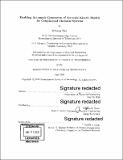Enabling automatic generation of accurate kinetic models for complicated chemical systems
Author(s)
Han, Kehang.
Download1102788108-MIT.pdf (20.94Mb)
Other Contributors
Massachusetts Institute of Technology. Department of Chemical Engineering.
Advisor
William H. Green.
Terms of use
Metadata
Show full item recordAbstract
The past decades have seen much progress in predictive kinetic modeling. Reaction mechanisms have shown increased predictive capability, providing key insights into chemical transformations under conditions of interest. Coupled and integrated in multiscale-multiphysics models, reaction mechanisms help elucidate physical phenomena that are driven by chemical kinetics and are recognized as a necessary tool for chemical selection, reactor design and process optimization. These past kinetic modeling achievements have opened new opportunities for novel scientific applications in chemical kinetics community and encouraged kinetic modelers to study even more complex chemical systems. As one can expect, the system complexity significantly increases modeling cost in both reaction mechanism construction and simulation. Over the years we have seen formulation of various lumping strategies. Despite simplicity, the lumping strategy introduces an intrinsic error where the lumps contain molecules with very different reactivities. Frequently, oversimplified models using the kinetic parameters fitted from a very limited set of pilot experiments, resulting in poor accuracy in extrapolation. This thesis focuses on automated detailed kinetic modeling strategy using Reaction Mechanism Generator (RMG). RMG-generated models more faithfully represent the chemistry so they have superior extrapolation potential. But as system complexity increases, several computational limitations prevent RMG from converging. This thesis has made several contributions: reducing memory usage, boosting algorithm scalability, improving thermochemistry estimation accuracy, which eventually expand RMG's modeling capability toward large complex systems. These contributions are available to the kinetics community through the RMG software package. To demonstrate the improved modeling capability of RMG, the thesis also includes a large chemical application: heavy oil thermal decomposition under geological conditions via a C18 model compound, phenyldodecane. As an extension of RMG, the thesis also explores a promising alternative to detailed kinetic modeling when dealing with extremely large chemical systems: fragment-based kinetic modeling, which generates a reaction network in fragment space rather than molecule space. The thesis shows via a case study that the new method creates a much smaller reaction network but with similar prediction accuracy on feedstock conversion and products' molecular weight distribution compared to its counterpart model generated by RMG.
Description
Thesis: Ph. D., Massachusetts Institute of Technology, Department of Chemical Engineering, 2018 Cataloged from PDF version of thesis. Includes bibliographical references.
Date issued
2018Department
Massachusetts Institute of Technology. Department of Chemical EngineeringPublisher
Massachusetts Institute of Technology
Keywords
Chemical Engineering.